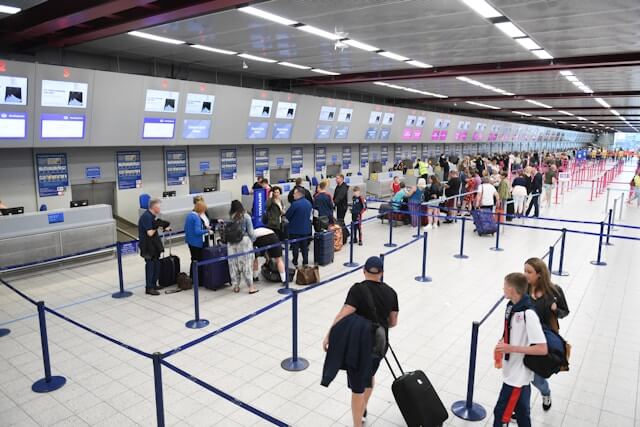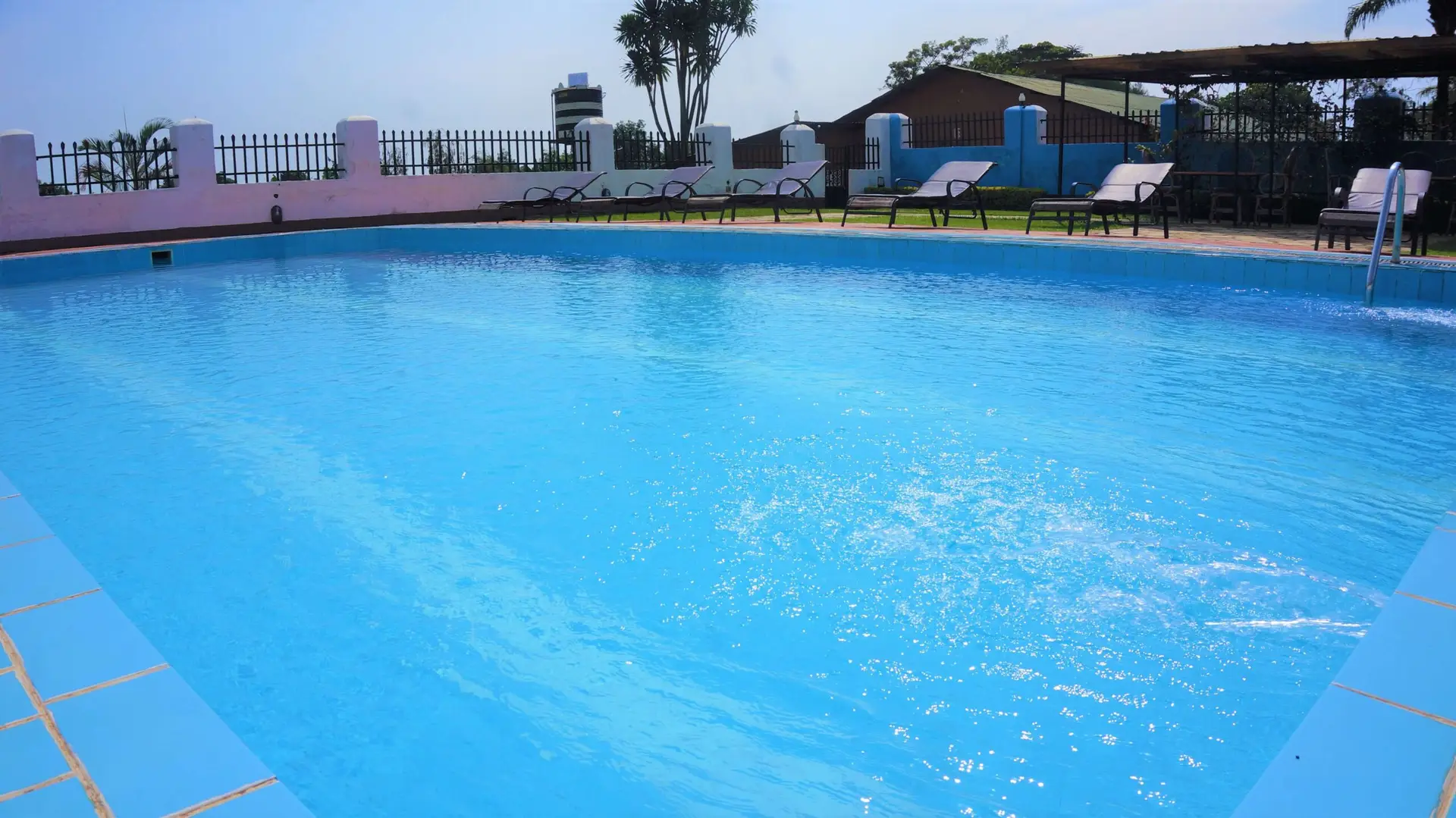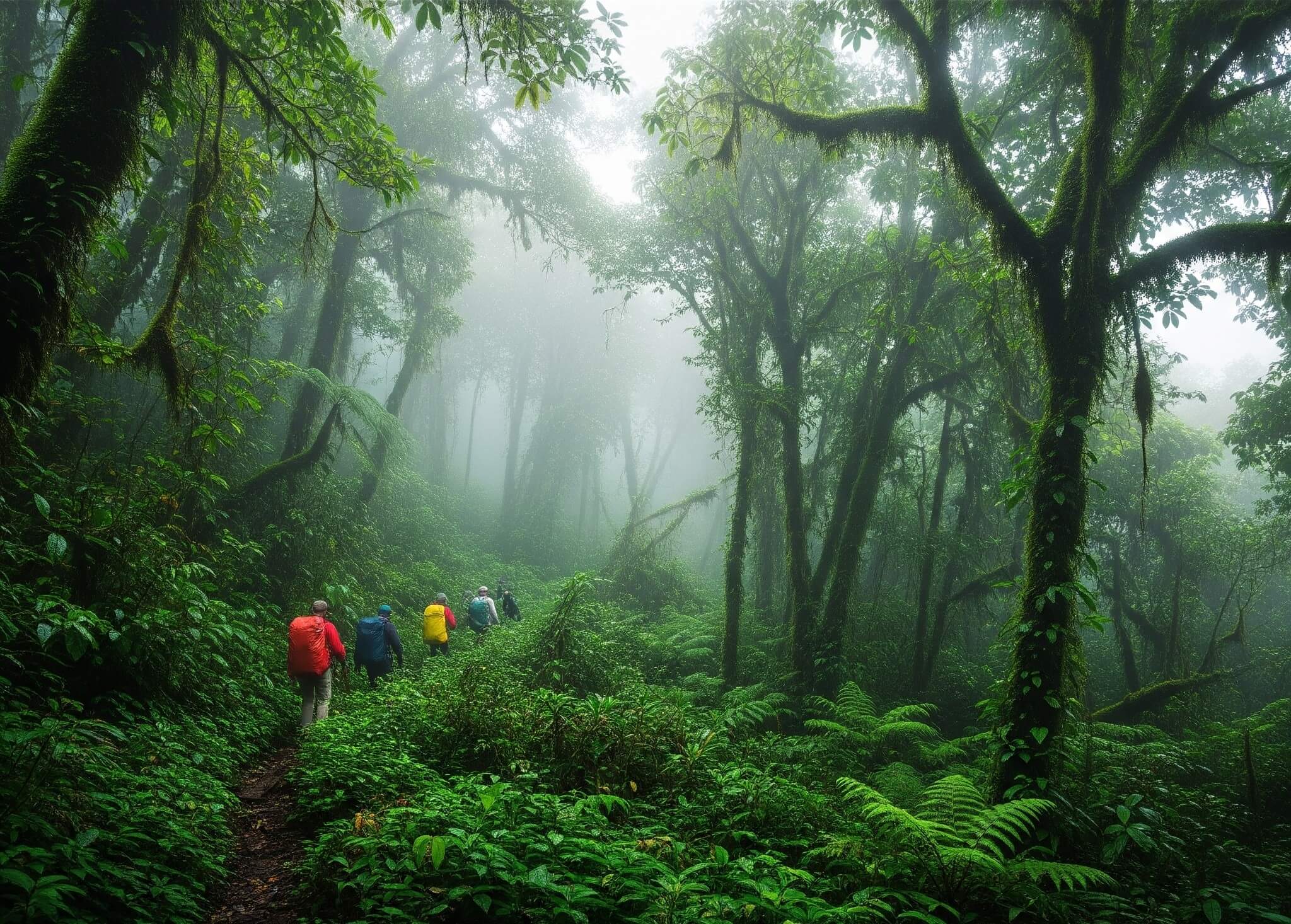Kibale Chimpanzee Trekking Permit Prices and Booking: Your Complete 2026 Guide
The morning mist rises from the dense canopy of Kibale Forest as distant pant-hoots echo through the trees your encounter with our closest living relatives is about to begin. But before you can experience the magic of Kibale chimpanzee trekking permit prices and booking, understanding the practicalities of permits, costs, and reservation processes is essential for turning your primate adventure dreams into reality.
Planning a chimpanzee trekking adventure in Uganda’s Kibale National Park requires more than just wanderlust it demands careful preparation, proper permits, and strategic booking. Whether you’re a wildlife enthusiast from the UK planning your first African safari or a seasoned American traveler adding another primate experience to your collection, this comprehensive guide will walk you through everything you need to know about securing your spot among the chimpanzees.
Understanding Kibale National Park Chimpanzee Permits
Kibale Forest National Park protects over 1,500 chimpanzees across its 795 square kilometers of pristine tropical rainforest in western Uganda. As the “Primate Capital of the World,” this UNESCO Biosphere Reserve offers two distinct chimpanzee experiences, each requiring separate permits issued by the Uganda Wildlife Authority.
Types of Chimpanzee Trekking Permits Available
Standard Chimpanzee Tracking Permits grant you a one-hour encounter with a habituated chimpanzee community after locating them in the forest. These treks typically last 2-5 hours total, depending on where the chimps have nested overnight and their morning foraging patterns.
Chimpanzee Habituation Experience Permits offer an exclusive full-day adventure, spending up to eight hours with a chimpanzee group undergoing the habituation process. This premium experience allows you to observe researchers at work while witnessing intimate chimp behaviors from dawn feeding rituals to nest-building at dusk.
The fundamental difference lies not just in duration but in the depth of experience. Standard tracking satisfies most visitors’ desire to see chimpanzees in their natural habitat, while habituation appeals to photographers, researchers, and primate enthusiasts seeking unparalleled access to chimpanzee society.
Current Kibale Chimpanzee Trekking Permit Prices
Understanding the investment required for your chimpanzee encounter helps you budget appropriately for this once-in-a-lifetime experience.
2026 Permit Pricing Structure
Standard Chimpanzee Tracking Permits:
- Foreign Non-Residents: USD $250 per person
- Foreign Residents: USD $200 per person
- East African Citizens: UGX 180,000
Chimpanzee Habituation Experience Permits:
- Foreign Non-Residents: USD $300 per person
- Foreign Residents: USD $250 per person
- East African Citizens: UGX 250,000
These prices remain competitive compared to gorilla trekking permits while offering equally thrilling primate encounters. The Uganda Wildlife Authority occasionally adjusts rates, so confirming current prices when booking is advisable.
What’s Included in Your Permit Cost
Your chimpanzee trekking permit includes guided ranger services, park entrance fees, and the designated one-hour viewing time with habituated chimpanzees. For habituation experiences, the extended eight-hour observation period with researcher accompaniment is covered.
However, permits do NOT include accommodation, meals, transportation to Kibale National Park, or additional activities like the Bigodi Wetland Sanctuary walk or crater lake tours. Budgeting for comprehensive safari packages ensures you’re prepared for the full expense of your adventure.
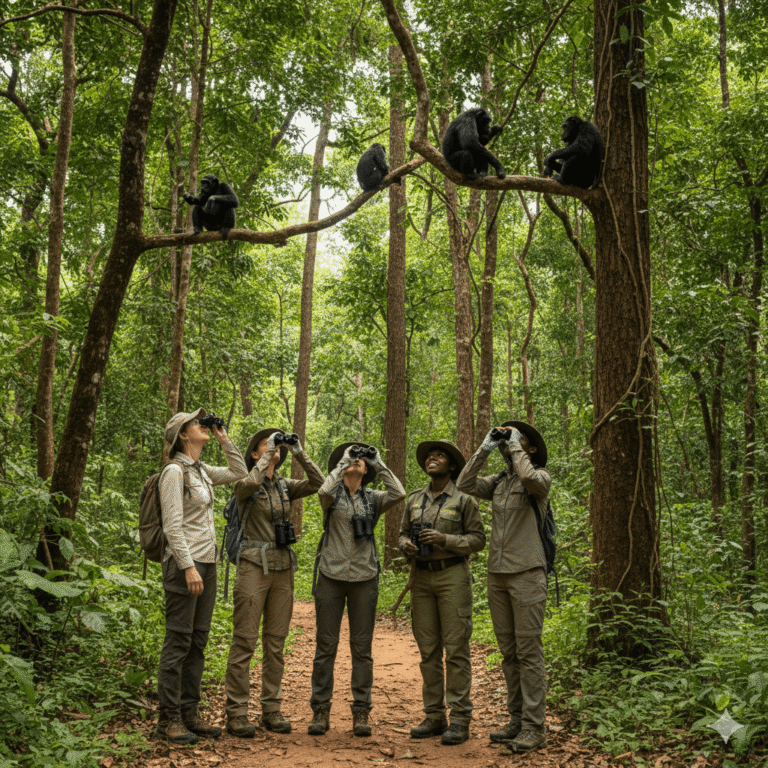
How to Book Your Kibale Chimpanzee Trekking Permit
Securing your permit requires navigating Uganda’s booking system, which can be complex for international travelers unfamiliar with East African tourism procedures.
Direct Booking Through Uganda Wildlife Authority
The Uganda Wildlife Authority (UWA) manages all permits through their official website and headquarters in Kampala. International travelers can book directly by:
- Visiting the UWA website and creating an account
- Checking permit availability for your preferred dates
- Completing the online application with passport details
- Making payment via international wire transfer or approved payment gateways
- Receiving confirmation and permit documentation via email
Direct booking offers cost transparency but requires managing logistics independently transportation, accommodation, and activity coordination become your responsibility.
Booking Through Licensed Tour Operators
The majority of UK and US travelers choose licensed Uganda tour operators who handle the entire booking process, including:
- Permit procurement with guaranteed availability
- Transportation from Entebbe or Kampala to Fort Portal town which is right next to Kibale Forest
- Accommodation arrangements at lodges near the national forest
- Activity coordination and experienced guide services
- Emergency support and communication throughout your safari
Tour operators charge service fees above permit costs but provide invaluable peace of mind, especially for first-time visitors to Uganda. They maintain relationships with the Uganda Wildlife Authority ensuring permit access even during high-season scarcity.
Let's help you plan
Our travel experts are ready to help you plan and book your memorable Chimpanzee experience.
Booking Timeline: When to Reserve Your Permits
Peak Season (June-September, December-February): Book 4-6 months in advance. Permits sell out rapidly during dry seasons when trail conditions are optimal and international travel peaks.
Shoulder Season (March-May, October-November): Book 2-3 months ahead. Wet season sees fewer tourists but incredibly lush forest conditions and active chimpanzee behaviors.
Last-minute bookings (within 2-4 weeks) occasionally succeed during low season, but risking permit unavailability could derail your entire Uganda itinerary. Early planning ensures you secure your preferred dates.
Step-by-Step Chimpanzee Trekking Booking Process
Let’s walk through the practical steps to secure your Kibale chimpanzee encounter, whether booking independently or through operators.
Choosing Your Trekking Date
Consider these factors when selecting your trekking date:
Weather Patterns: Kibale’s equatorial climate means year-round trekking, but dry seasons (June-September, December-February) offer easier hiking conditions. However, wet seasons (March-May, October-November) feature spectacular forest verdure and fewer tourists.
Personal Fitness Levels: Chimpanzee tracking involves forest hiking across sometimes steep, muddy terrain. Assess your physical capabilities honestly when planning your adventure timeline.
Photography Opportunities: Overcast wet-season conditions can actually benefit photography by providing diffused lighting, while dry-season clarity offers vibrant canopy colors.
Required Documentation for Permit Applications
Prepare these documents before beginning your booking:
- Valid passport with at least six months remaining validity
- Proof of yellow fever vaccination (mandatory for Uganda entry)
- Travel insurance documentation covering adventure activities
- Emergency contact information
- Special requirements (dietary restrictions, mobility limitations, medical conditions)
Having documentation ready expedites the booking process and prevents last-minute scrambling.
Payment Methods and Processing Times
Uganda Wildlife Authority accepts:
- International wire transfers (allow 5-7 business days for processing)
- Credit cards through approved gateways (immediate processing with confirmation)
- Mobile money transfers for East African residents
Tour operators typically accept major credit cards, PayPal, and wire transfers with their own processing timelines. Confirm payment deadlines to avoid losing provisional bookings.
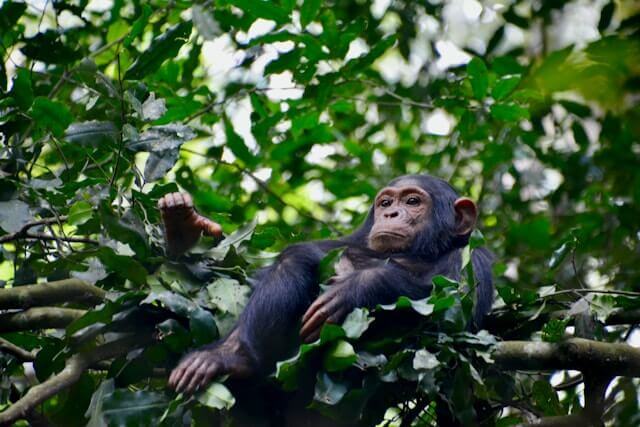
Where to Stay: ATACO Country Resort a quiet spot next to Kibale
Your accommodation choice significantly impacts your overall chimpanzee trekking experience, affecting everything from pre-dawn departure times to post-trek relaxation.
ATACO Country Resort: Your Kibale Forest Gateway
Strategically located near Kibale National Park, ATACO Country Resort offers the perfect base for your primate adventure. This charming eco-lodge combines comfortable accommodations with authentic Ugandan hospitality, providing weary trekkers with everything needed for an exceptional Kibale experience.
Why Choose ATACO Country Resort:
Proximity to Trekking Start Points: Just minutes from Kanyanchu Visitor Center where all chimpanzee treks begin, ATACO eliminates stressful early-morning rushes. You’ll enjoy leisurely breakfasts before your 8:00 AM or 2:00 PM briefings.
Comfortable, Well-Appointed Rooms: After hours of forest trekking, retreat to spacious rooms featuring comfortable beds, hot water showers, and private balconies overlooking the lush surroundings. Nothing beats reflecting on your chimpanzee encounter from your own peaceful sanctuary.
Authentic Local Cuisine: ATACO’s restaurant serves delicious Ugandan and international dishes prepared with fresh local ingredients. Dietary requirements are accommodated with advance notice, ensuring every guest enjoys satisfying meals.
Expert Local Knowledge: The resort’s staff provides invaluable insights about Kibale’s attractions, optimal trekking times, and cultural experiences. Their connections with local guides and the Uganda Wildlife Authority can assist with last-minute arrangements.
Additional Activities: Beyond chimpanzee trekking, ATACO arranges crater lake tours, Bigodi Wetland Sanctuary visits, community cultural experiences, and birding excursions. Multi-day stays reveal Kibale’s full splendor.
Accommodation Booking Strategies
Coordinate your accommodation reservations with your permit dates. Many travelers mistakenly book rooms before securing permits, only to discover permit unavailability forces itinerary changes. Follow this sequence:
- Check permit availability for desired dates
- Reserve permits (directly or through operators)
- Book accommodation matching confirmed permit dates
- Arrange transportation logistics
ATACO Country Resort offers flexible booking policies understanding the complexities of safari planning. Contact them directly when coordinating your Kibale adventure.
Let's help you plan
Our travel experts are ready to help you plan and book your memorable Chimpanzee experience.
Preparing for Your Chimpanzee Trekking Experience
Proper preparation ensures you maximize your time with the chimpanzees while staying safe and comfortable in Kibale’s challenging forest environment.
What to Pack for Chimpanzee Tracking
Essential Gear:
- Sturdy, waterproof hiking boots with ankle support and good tread
- Long-sleeved shirts and trousers (protects against vegetation, insects, and scratches)
- Lightweight rain jacket (sudden tropical downpours occur year-round)
- Daypack for carrying water, snacks, and camera equipment
- Hat and sunglasses for exposed trail sections
- Insect repellent containing DEET
- High SPF sunscreen (equatorial sun is intense)
Photography Equipment:
- Camera with telephoto lens (70-200mm or 100-400mm ideal)
- Extra batteries and memory cards
- Waterproof camera bag or dry bag
- Binoculars for distant observations
Avoid wearing bright colors, strong perfumes, or noisy jewelry that might disturb the chimpanzees or other wildlife.
Physical Fitness Requirements
Chimpanzee tracking doesn’t require marathon-runner fitness, but moderate conditioning helps you enjoy the experience without exhaustion. Treks involve:
- 2-5 hours of forest hiking (standard tracking)
- 6-8 hours of walking (habituation experience)
- Uneven terrain with hills, streams, and muddy sections
- High humidity and warm temperatures
If you have mobility concerns, inform guides during briefings. They’ll adjust pace and provide walking sticks. The Uganda Wildlife Authority offers porter services—local community members who carry your daypack for a small fee, providing both assistance and community income.
Health and Safety Considerations
Medical Precautions:
- Complete required vaccinations (yellow fever mandatory, others recommended)
- Take antimalarial prophylaxis (Kibale has minimal malaria risk but prevention advised)
- Carry personal medications in original containers
- Purchase comprehensive travel insurance covering medical evacuation
Chimpanzee Viewing Etiquette:
- Maintain 8-meter (26-foot) distance from chimpanzees
- Never eat or drink near the primates
- Cover coughs and sneezes (respiratory diseases transfer between species)
- Stay with your group and follow ranger instructions
- Avoid direct eye contact (chimps may interpret as aggressive)
- No flash photography (disturbs and stresses animals)
These protocols protect both humans and chimpanzees from disease transmission while ensuring safe, ethical wildlife encounters.
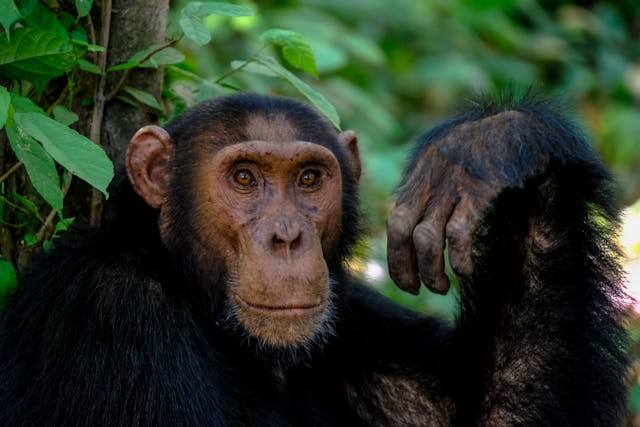
The Chimpanzee Trekking Day Experience
Understanding what happens during your trek helps you prepare mentally and physically for this extraordinary encounter.
Pre-Trek Briefing at Kanyanchu
Your day begins at Kanyanchu Visitor Center where Uganda Wildlife Authority rangers conduct mandatory briefings. Arriving by 7:30 AM for the 8:00 AM session (or 1:30 PM for afternoon treks), you’ll learn:
- Current chimpanzee community locations
- Trail conditions and expected hiking duration
- Safety protocols and emergency procedures
- Viewing etiquette and photography guidelines
- Forest ecosystem overview
Rangers assign groups of up to six visitors per chimpanzee community, ensuring intimate experiences without overwhelming the primates. Group composition balances fitness levels when possible.
The Forest Search Begins
Guided by experienced rangers and trackers, you’ll enter Kibale’s magnificent rainforest, a cathedral of towering trees draped with vines and echoing with wildlife sounds. The search begins where trackers last observed your assigned chimpanzee community, typically their previous night’s nesting site.
Walking quietly through the forest, rangers interpret signs: fresh feeding remains (half-eaten fruits), knuckle prints in mud, broken vegetation marking their passage, and of course, their vocalizations. Chimpanzees communicate through an impressive repertoire—pant-hoots establishing location, screams during excitement, and soft grunts during peaceful feeding.
The moment you hear nearby calls, anticipation intensifies. Rangers signal silence as you approach, then suddenly—there they are! A family group feeding in the canopy above, grooming on lower branches, or playing on the forest floor.
The One-Hour Encounter
Your official viewing time begins when the group stops moving. For sixty magical minutes, you’ll observe chimpanzee society in action:
Social Interactions: Watch hierarchical displays as dominant males assert status, mothers tenderly caring for infants, and adolescents engaging in raucous play. The complexity of their relationships rivals human family dynamics.
Feeding Behaviors: Chimpanzees are omnivorous, consuming over 200 plant species plus occasional insects and small mammals. You might see them expertly extracting termites with sticks (tool use!), cracking nuts, or devouring figs.
Communication: Their vocalizations serve specific purposes—pant-hoots locate separated group members, laughter-like sounds accompany play, and alarm calls warn of threats. Combined with rich gestural communication, their “language” demonstrates remarkable intelligence.
Individual Personalities: Spend an hour observing, and distinct personalities emerge. The curious juvenile testing boundaries, the patient matriarch maintaining order, the contemplative older male surveying his territory—each chimpanzee displays unique character.
Photography opportunities abound, though forest lighting challenges even experienced wildlife photographers. Rangers guide you to optimal positions while ensuring you maintain required distances.
When the hour concludes, saying goodbye to these extraordinary creatures proves difficult. The return hike feels shorter as you process what you’ve witnessed, sharing excited observations with fellow trekkers.
Beyond Standard Tracking: The Habituation Experience
For visitors seeking deeper immersion into chimpanzee society, the habituation experience offers unparalleled access.
What Makes Habituation Different
Standard tracking visits fully habituated communities accustomed to human presence. Habituation experiences instead follow communities still adjusting to observers. A process taking 2-3 years before chimpanzees ignore humans enough for tourism.
You’ll accompany researchers documenting behaviors, collecting data on feeding patterns, social structures, and ranging habits. This scientific context enriches your understanding while contributing to conservation efforts.
A Full Day with the Chimps
Habituation days start early (5:30-6:00 AM) to intercept chimpanzees as they wake and climb down from overnight nests. You’ll observe:
Morning Rituals: Watch them stretch, groom, and organize for the day’s activities. Dawn represents prime photography time with soft lighting and active behaviors.
Foraging Patterns: Follow as they range through their territory seeking food—traveling several kilometers daily across varied terrain.
Midday Rest: During the hottest hours, chimpanzees often rest in shady areas, grooming each other and napping. This quiet period allows close observation of gentle interactions.
Afternoon Activities: Renewed energy brings increased movement, play, and social interactions before evening nest-building.
Nest Construction: As dusk approaches, chimpanzees select sleeping trees and construct fresh nests—elaborate platforms woven from branches. Watching this behavior demonstrates their cognitive complexity.
The eight-hour experience provides incredible insights impossible during standard tracking’s single hour. You’ll leave with profound appreciation for chimpanzee intelligence, social complexity, and environmental challenges.
Maximizing Your Kibale National Park Visit
While chimpanzees are Kibale’s star attraction, additional activities create well-rounded itineraries.
Bigodi Wetland Sanctuary
Adjacent to Kibale Forest, this community-managed sanctuary protects pristine wetlands teeming with primates, birds, and butterflies. The 4-5 hour guided walk encounters black-and-white colobus monkeys, red colobus, grey-cheeked mangabeys, and potentially eight other primate species.
Birders particularly love Bigodi, with over 200 species recorded including the rare Nahan’s francolin and papyrus gonolek. Community guides provide ecological information while tourism revenue supports local development projects.
Crater Lake Tours
Kibale’s landscape features numerous volcanic crater lakes—stunning blue-green pools surrounded by forest. Popular options include:
Lake Nkuruba: Perfect for swimming and canoeing with dramatic crater walls rising around you.
Top of the World Viewpoint: Panoramic vista revealing multiple crater lakes dotting the landscape.
Guided nature walks around crater rims combine exercise with exceptional photography opportunities and bird sightings.
Cultural Encounters
Community tourism initiatives connect visitors with local Batoro and Bakiga cultures. Experiences include traditional dance performances, homestead visits, craft demonstrations, and learning about subsistence farming practices. These interactions provide cultural context for your wilderness adventure while supporting rural livelihoods.
ATACO Country Resort arranges all these complementary activities, creating comprehensive Kibale experiences beyond chimpanzee trekking alone.
Conservation and Responsible Tourism
Your permit purchase directly funds chimpanzee conservation and community development, but responsible tourism requires additional commitments.
How Your Visit Helps Chimpanzees
Revenue from Kibale chimpanzee trekking permits supports:
Anti-Poaching Efforts: Funding ranger patrols protecting chimpanzees from hunting and illegal logging encroachment.
Habitat Protection: Maintaining the forest ecosystem chimpanzees depend on, including corridor preservation connecting Kibale to Queen Elizabeth National Park.
Research Programs: Scientific studies informing conservation strategies and monitoring population health.
Community Development: Revenue sharing with villages surrounding Kibale reduces human-wildlife conflict by demonstrating wildlife’s economic value.
Chimpanzees face severe threats across Africa—habitat loss, poaching, and disease reduce populations annually. Tourism provides critical incentive for their protection, making your visit an active conservation contribution.
Ethical Wildlife Tourism Principles
Follow these guidelines ensuring your Kibale experience benefits rather than harms chimpanzees:
Respect Viewing Distances: The 8-meter rule prevents disease transmission and reduces stress on habituated communities.
Follow Ranger Instructions: Their expertise keeps both you and the chimpanzees safe while maximizing viewing opportunities.
Support Local Businesses: Staying at locally-owned accommodations like ATACO Country Resort and hiring Ugandan tour operators ensures tourism benefits flow to communities.
Minimize Environmental Impact: Carry out all trash, stay on designated trails, and avoid purchasing products made from forest resources.
Share Your Experience Responsibly: Social media and travel reviews spreading awareness about chimpanzee conservation inspire others while promoting sustainable tourism operators.
According to research published by the International Union for Conservation of Nature, responsible wildlife tourism represents one of the most effective strategies for protecting endangered primates while supporting human communities.
Planning Multi-Day Kibale Itineraries
Most visitors dedicate 2-4 days to Kibale National Park, allowing multiple activities without rushed schedules.
Sample 3-Day Kibale Itinerary
Day 1: Arrival and Acclimatization
- Arrive at ATACO Country Resort from Entebbe/Kampala (5-6 hour drive)
- Afternoon relaxation or short crater lake walk
- Early dinner and briefing about next day’s trek
Day 2: Chimpanzee Trekking
- Early breakfast at ATACO
- Morning chimpanzee tracking (8:00 AM start)
- Return to lodge for lunch and rest
- Afternoon Bigodi Wetland Sanctuary walk
- Evening reflection on your primate encounters
Day 3: Additional Activities and Departure
- Optional second chimpanzee trek or habituation experience
- Crater lake tour and cultural village visit
- Departure after lunch or extend stay
This balanced itinerary provides chimpanzee encounters without exhaustion while experiencing Kibale’s broader attractions.
Combining Kibale with Other Experiences
While your instructions emphasize focusing on Kibale exclusively, many travelers wonder about extending their Uganda adventure. Discuss these possibilities with your tour operator when planning your specific Kibale dates and permit bookings.
Looking to Combine Other Experiences?
Frequently Asked Questions About Kibale Permits and Booking
How far in advance should I book my chimpanzee trekking permit?
Book 3-6 months ahead for peak season (June-September, December-February) and 2-3 months for shoulder season. Last-minute bookings risk permit unavailability during your preferred dates.
Can children participate in chimpanzee trekking?
The minimum age is 12 years for standard tracking and 15 years for habituation experiences. This ensures children can handle the physical demands and follow safety protocols.
What if I need to cancel my permit?
Cancellation policies vary by booking method. Direct Uganda Wildlife Authority bookings typically forfeit 50% if cancelled within 90 days. Tour operators may offer more flexible terms. Always purchase travel insurance covering cancellations.
Do permits sell out?
Yes, especially during peak season. Kibale allows limited daily visitors (each habituated group receives only 6-8 tourists), so popular dates book quickly.
Can I book multiple trekking days?
Absolutely! Multiple treks increase your chances of exceptional encounters and allow observing different chimpanzee communities. Budget permitting, 2-3 treks provide incredible comparative experiences.
What happens if chimpanzees aren’t found?
Extremely rare due to expert trackers and GPS-collared individuals in some communities. If unsuccessful (less than 1% probability), the Uganda Wildlife Authority may offer another opportunity, though this isn’t guaranteed.
Weather and Seasonal Considerations
Understanding Kibale’s climate helps you choose optimal trekking dates matching your preferences.
Dry Season Advantages (June-September, December-February)
- Easier trail conditions with less mud
- More predictable weather for photography
- Higher wildlife visibility in thinning vegetation
- Peak tourist season creating vibrant atmosphere
- Higher permit demand requiring advance booking
Wet Season Benefits (March-May, October-November)
- Dramatically lush, green forest scenery
- Fewer tourists providing more intimate experiences
- Reduced accommodation rates at lodges
- Active chimpanzee behaviors and breeding activities
- Excellent birding as migrants arrive
Both seasons offer outstanding chimpanzee encounters—the best choice depends on your priorities regarding hiking conditions versus forest aesthetics and crowd sizes.
Making Your Booking
The echoes of chimpanzee pant-hoots calling through Kibale’s ancient forest await you. These remarkable primates—sharing 98.7% of our DNA—offer windows into our evolutionary past while inspiring conservation action for their uncertain future.
Ready to Book Your Kibale Chimpanzee Adventure?
Don’t let permit availability or planning complexity delay your dream primate encounter. Whether you’re a solo traveler seeking wildlife connection, a couple planning a romantic African adventure, or a family creating lifetime memories, Kibale National Park delivers transformative experiences.
Contact ATACO Country Resort today to coordinate your chimpanzee trekking permits, accommodation, and complete Kibale itinerary. Their experienced team handles all logistics, from Uganda Wildlife Authority permit processing to transportation arrangements allowing you to focus on anticipation rather than administration.
Check out this booking page or to begin planning your Kibale chimpanzee trekking adventure. Early booking ensures your preferred dates while providing time for proper trip preparation.
The chimpanzees of Kibale Forest are waiting. Your adventure begins with that first step—booking your permit and embracing the extraordinary journey ahead.
